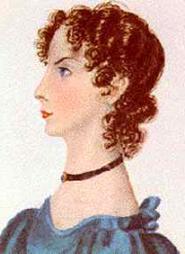
On Wednesday I wrote about Mary Ward’s introduction to The Tenant of Wildfell Hall by Anne Brontë. And the more I think about it, the more I realize it wasn’t so much an introduction to the novel as it was a critique of Anne in comparison to her sisters. It does talk about the novel briefly, but mostly serves as a diatribe of the weakness of Anne’s literary contributions in comparison to Emily and Charlotte Brontë. IF you’re interested in reading What about Anne Brontë? Part 1, click here.
One of the great things about the Kindle version I am reading is that it is the second printing of The Tenant of Wildfell Hall and it contains a forward by the author. In the forward she, writing as Acton Bell, has quite a bit to say in response to her supporters and detractors. Something else to note is that at publication, aside from Jane Eyre, The Tenant of Wildfell Hall was the most successful of the Brontë’s novels. Without further ado let’s see what Anne has to say:
To represent a bad thing in its least offensive light is, doubtless, the most agreeable course for a writer of fiction to pursue; but is it the most honest, or the safest? Is it better to reveal the snares and pitfalls of life to the young and thoughtless traveller, or to cover them with branches and flowers? Oh, reader! if there were less of this delicate concealment of facts—this whispering, ‘Peace, peace,’ when there is no peace, there would be less of sin and misery to the young of both sexes who are left to wring their bitter knowledge from experience.
and continues,
Yet, be it understood, I shall not limit my ambition to this—or even to producing ‘a perfect work of art’: time and talents so spent, I should consider wasted and misapplied. Such humble talents as God has given me I will endeavour to put to their greatest use; if I am able to amuse, I will try to benefit too; and when I feel it my duty to speak an unpalatable truth, with the help of God, I will speak it, though it be to the prejudice of my name and to the detriment of my reader’s immediate pleasure as well as my own.
and closes,
All novels are, or should be, written for both men and women to read, and I am at a loss to conceive how a man should permit himself to write anything that would be really disgraceful to a woman, or why a woman should be censured for writing anything that would be proper and becoming for a man.
And what she does, I believe, is answer the critics. She says I have written things the way I view the world. It may not be as convoluted or complex as my sisters’ views of the world, but it is my view. I have not spent time crafting a masterpiece or ‘a perfect work of art’ but have humbly created something that gives me pleasure and hopefully pleasures others. And finally she closes saying a novel should stand on its own accord regardless of subject or author’s sex.
Having read only 50% of The Tenant of Wildfell Hall I cannot answer specifically to all of the critiques raised by Mrs. Ward nor the responses provided by Ms. Brontë, but what I can say is that this book is well ahead of its time. In highlighting the plights of women and their inability to cope with their husband’s unruly tendencies and their being forced to kowtow to society’s expectations, Anne wrote a scandalously observant and true novel, if not a literature masterpiece.
When I finish the novel, I will conclude my thoughts on this series and hopefully that’ll be by the end of next week, so keep an eye out for What about Anne Brontë? Part 3 and the review of the novel itself.


I really want to read her novels now.
I would encourage you to! And they’re relatively quick reads (or were for me).
I adore Anne’s frankness.
Yeah. I’m realizing how great she is. I can really appreciate it compared to her sisters. It’s great, digging around I found a few comparisons of her to Jane Austen which made me happy.